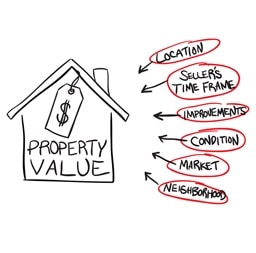 When you’re selling your home and the closing date is looming, the last phone call you want to take is the one from your buyer informing you that the appraisal for his or her loan has come in below the sale price—and asking if you would consider taking less money.
When you’re selling your home and the closing date is looming, the last phone call you want to take is the one from your buyer informing you that the appraisal for his or her loan has come in below the sale price—and asking if you would consider taking less money.
Getting this far with the sale, you’ve likely endured one of the less happy experiences of your life. But asking you to take less after you’ve priced the house to sell and negotiated the deal as far as you can? Just because someone else’s lender got a goofy appraisal?
Unfortunately thousands of sellers are caving in to low appraisals. They know for a fact that qualified buyers don’t grow on trees these days. What they don’t know is how to fight back.
The problem of low appraisals
Low appraisals have always been a problem, especially in times like these. Appraisers have few choices for comparable properties because either the sales volume is low, large numbers of foreclosures are distorting prices, or prices are changing rapidly.
Recent developments in the appraisal field, including a new code of conduct called HVCC and the emergence of appraisal management companies that crank out appraisals for considerably lower cost—and some say lower quality—than appraisals by traditional appraisers, also have contributed to this growing problem.
The appraisal situation has grown so critical that low appraisals were one of the leading reasons that one out of every three purchase contracts washed out in October, according to the National Association of Realtors (NAR). An August NAR survey of the group’s members found that 11 percent of Realtors saw contracts collapse and an additional 13 percent saw prices negotiated downward because of low appraisals.
In today’s market environment, three different appraisers working independently can easily come up with three different appraisals for your home that will vary significantly. How do you work things out so that the one that counts is as high as your sale price?
Sorting through appraisals – five options for sellers
The first thing you do is tell the buyer no, you don’t want to lower your price, but if he still wants the house, together you might be able to resolve the problem.
Option 1: Call your Realtor and ask for a Broker’s Price Opinion (BPO) or Comparative Market Analysis (CMA) of your home, if you don’t already have one. These are essentially the same thing—a professional opinion of the value of the home based on recent sales and current listings—but they do not carry the weight of an appraisal.
Option 2: Review the appraisal with your Realtor and his or her CMA. Where are the discrepancies? What is making the appraisal so much lower than the CMA?
Option 3: Sit down with your buyer and make the case that he deserves a new appraisal, especially if an out-of-town appraiser unfamiliar with your market conducted the first one. Ask the buyer to call his lender, provide that lender with a copy of the CMA, and request a second appraisal. This is going to cost the buyer $400 or so, which you might offer to split with him.
It is important to note that the buyer has a legal right to a copy of the appraisal from his lender and to find out who did it. Other questions that should be asked:
- What is the appraiser’s reputation?
- Have any complaints been filed with your state appraisal-licensing agency?
- Where is the appraiser based?
- Did the appraiser perform an appraisal in a housing market that he or she may not know well?
- Did the appraiser have adequate information about the property?
Option 4: You can strengthen your case by getting your own independent appraisal, which will have more authority than your CMA. Hire a reputable local appraiser and make sure he or she has seen your CMA. Make sure the appraiser understands the situation and must find the best comps to make your case.
Option 5: You can get two additional, unbiased appraisals and use the average of all three to arrive at a fair price. This is a risky strategy in light of the fact that another appraisal might not come in higher than your first; it might even be lower if values have fallen.
Remember that the lender wants assurance that your home will be worth enough to recoup its investment. The key to a successful dispute is data. You will need as much data you can get to back up your position.
Depending on how convincing your argument is, the lender has the ability to override your challenge to the appraisal, which is unlikely, or to order a new appraisal.
A last resort tactic
If all other efforts fail, you can save the deal by offering to carry a second mortgage to pay for the difference. This solution doesn’t cost you anything and amounts to receiving a small portion of your total sale price over time—say five years or less. After closing, you can often retain the right to discount the second mortgage, and you can then sell it for less than face value to an investor.
Steve Cook is editor of Real Estate Economy Watch and covers real estate and mortgage finance for leading news sites. He is a member of the board of the National Association of Real Estate Editors and was twice named one of the 100 most influential people in real estate. Cook was vice president for public affairs for the National Association of Realtors.





